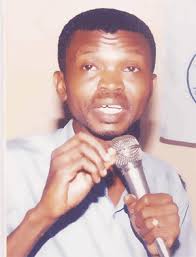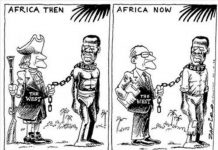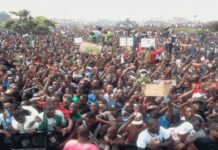by Baba Aye
 Chima Ubani died in a car accident with Tunji Oyeleru, the Vanguard photo-editor on September 21, 2005 at Potiskum, he was just 42 years old and one of the most compassionate revolutionaries in Nigeria. He died in the active service of struggle for a better society where working people would be the subject of their history and not mere objects of exploitation by the bosses.
Chima Ubani died in a car accident with Tunji Oyeleru, the Vanguard photo-editor on September 21, 2005 at Potiskum, he was just 42 years old and one of the most compassionate revolutionaries in Nigeria. He died in the active service of struggle for a better society where working people would be the subject of their history and not mere objects of exploitation by the bosses.
He was on his way from a rally at Maiduguri to another at Yola. These rallies were part of a series of demonstrations organised by the Nigeria Labour Congress, Trade Union Congress and the newly formed Joint Action Forum of pro-working class civil society organisations, which together made up the Labour Civil Society Coalition (LASCO).
Born to the family of a Seventh Adventist pastor, Chima spent most of his conscious life as a rebel in defence of the cause of the oppressed. As a student of crop science at the University of Nigeria Nsukka (UNN), he first became active as a pan-Africanist, in the reggae movement.
He became president of the students union and a member of the Marxist Students Movement by the mid-80s, at a very trying moment for the radical left on campuses. The National Association of Nigerian Students had been banned and in UNN, the university authority collaborated with neo-fascist confraternity groups organised as “Operation Zero Option” who physically attacked activists.
Ubani was jailed when the military government cracked down on the students’ movement in the aftermath of the Ahmadu Bello University massacre of May 25, 1986. After being released, it took a court order for the university to allow him take his final examinations. But he still graduated at the top of his class.
He took up employment with the Civil Liberties Organisation after school and worked there for the rest of his life, rising to become its Executive Director. But CLO was for Chima, basically a platform for extending radical political work, organising struggle through several forms of united fronts with the aim of achieving “system change”.
Ubani was thus pivotal to the formation of the Campaign for Democracy (CD) at Jos in November, 1991. This was to be a united front of radical forces to fight for: overthrowing the military regime; establishing a mass-based provisional government and; convening a Sovereign National Conference. He became the first elected General Secretary of CD.
Chima was at the fore of CD’s struggle for the actualisation of June 12, in those rebellious days of 1993. He came up with the concept and practice of an “Expanded Secretariat” where a broad array of activists strategized together and organised mass actions under his leadership. He however broke with the CD at the Teachers’ House Convention of February 4, 1994, at Ibadan.
The dominant elements of CD had illusions in the “national bourgeoisie”. And through collaboration with MKO Abiola and his cohorts, they had implicitly supported the November 17, 1993 coup by General Sani Abacha. Their misplaced belief was that Abacha would hand over power to Abiola. The split within CD reflected deeper fissions within the socialist group which Chima belonged to, the Socialist Congress of Nigeria (SCON).
After walking out of the Convention, Chima and other rebellious members of SCON (who together were known as the SCON II) led discussions with a number of radical and revolutionary groups (including the May 31st Movement, which later became known as the Socialist Workers Movement, one of the two groups that formed the Socialist Workers League in 2011) on the need for a more focused radical front.
The result of these discussions was the formation of the Democratic Alternative (DA), a radical party of defiance, at Benin City on June 4, 1994. Chima was elected as the General Secretary at this founding convention. DA was modelled along the lines of the pre-1994 African National Congress (ANC) in South Africa. Its manifesto, The Liberation Charter was inspired by the ANC’s Freedom Charter. He was its Deputy President when he died.
Chima managed to escape arrest for a long time. More than once, secret police who had come for him were fooled by his slight frame and he would escape before it struck them that he was the larger than life picture they had in their heads. But eventually he got caught in 1995 and spent about a year in detention. Amnesty International declared him a prisoner of conscience and he was released a year later as a result of international mobilisation for his freedom.
Shortly after this, with General Abacha’s vice-grip becoming more vicious as he successfully crushed most mass democratic organisations resulting in the ebb of popular struggle by 1997, Chima Ubani was once again at the fore of finding practical ways forward, for the radical Left. This eventually took the form of the formation of the United Action for Democracy (UAD) on May 17, 1997.
UAD brought together different strands of the radical movement significantly those arrayed with the Campaign for Democracy (or rather a faction of it, as it had split in 1995) and those aligned to the DA. Chima Ubani was elected as one of its founding Co-secretaries (the other co-secretary was Sylvester Odione-Akhaine, who was General Secretary of the CD faction that was part of the founding of the UAD).
UAD gave new life to the democratic struggle against military dictatorship. It organised the “5-million man rally” in Yaba, Lagos, to counter the pro-Abacha “2-million man rally” organised by the sycophantic Youths Earnestly Ask Abacha (YEAA) group in Abuja, in 1998. This marked a re-ignition of the anti-military dictatorship struggle.
When the transition to a civilian regime was unfolded, DA resolved to participate in the transition. This led to a split in August 1998 at the Pending Hotel Convention in Port Harcout. Chima was convinced that the Left had to participate in the elections for a new republic, leading to a parting of ways with the May 31st Movement which had the largest number of delegates at the Convention.
Being in control of the bureaucracy of the party, those who stood for electoral participation (belonging mainly to the Marxist-Leninist SCON and Socialist Revolutionary Vanguard, SRV) walked out of the Conference where the short lived Peoples Democratic Liberation Party (PDLP) was formed.
But Chima Ubani (and Comrade Ola Oni, the SRV leader) kept communication channels open with the M31M, despite this sharp disagreement. Eventually, DA was not registered by the Independent National Electoral Commission. It however pursued its case in court along with parties like the National Conscience Party and the Peoples Redemption Party, opening the way for a liberalisation of the space for partisan politics with a court ruling in December 2002.
After the exit of the military, two interlinked issues dominated the focus of Chima’s politics. First was building unity of the socialist Left, the other was forging of closer ties between the revolutionary Left and the trade unions. In pursuit of the first, Chima was the moving spirit behind the summoning of the 3rd All Nigeria Socialist Conference on February 21-23, 2003, at Benin City.
He was elected as one of the two representatives of the Socialist Congress of Nigeria (the other was Festus Iyayi, this represented a unification somewhat of SCONs I and II), into the Working Committee of the Nigeria Socialist Alliance (NSA) which the Conference constituted.
Chima was unanimously elected within the WC as its Chair. But unfortunately, Chima was too busy with his tasks as Executive Director of CLO and could not provide the required leadership for the NSA. This was central to the atrophy and unsung death of the NSA after just three meetings of the WC.
The last of Chima’s organisational achievements was with regards to the second issue. As a leading civil society activist, Chima was always at the fore of several mass protests called along with general strikes against pump price hikes, starting from 2000. The way and manner the 2003 general strike was called off by the trade unions however led to grave cause for concern within the ranks of the socialist Left which constituted the leadership of the civil society movement.
Very much like what would later happen in a more intensive way in 2012, first the TUC and later the NLC, called off the general strike at a point when it was clear that it was leading to revolutionary openings. Chima Ubani and other radical civil society activists then made it clear to the trade unions that there was the need for the relationship between the radical civil society movement and the trade unions to be more clearly defined organisationally.
This was what led to the formation of the Labour Civil Society Coalition (LASCO), so that there would be a platform for discussions between the trade unions and civil society groups in planning, executing, and calling off mass actions. There was thus the need for the civil society components within LASCO to have a collective forum as well.
UAD represented the broadest form of a unified civil society coalition. But some groups, which included the faction of CD that had not joined in the formation of UAD (and which was then being led by Beko Ransome-Kuti after he was released from detention in 1998), were not part of it. Chima Ubani initiated discussions with them and this resulted in the formation of the Joint Action Forum as the civil society component of LASCO.
While Beko Ransome-Kuti emerged as the JAF Chair, Chima was unanimously made the General Secretary. It was in this capacity that he was a central figure in the 2005 rallies against neoliberal policies, particularly reflected in the incessant fuel price hikes. This would be his last duty, as death claimed this indefatigable soldier of the working class on the way to Yola.
Even in death, Chima’s very essence symbolised the life he lived; one for the working people. He not only died in the active service of the class he lived for. He died on September 21, exactly 30 years to the date that the Apena Declaration for trade union unity was signed by the leaders of the four trade union centres in Nigeria at the time, leading to the birth of the Nigeria Labour Congress.








